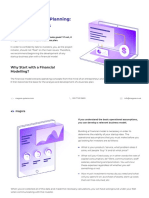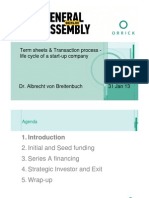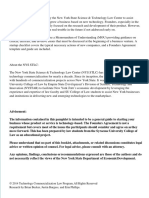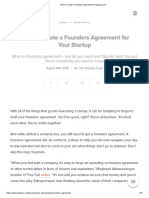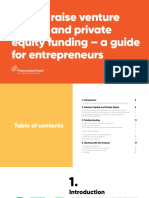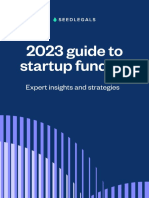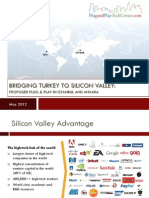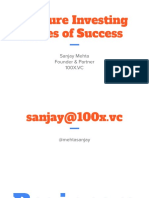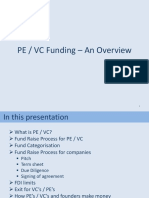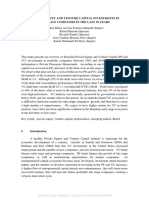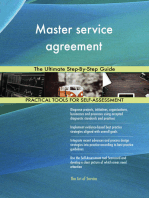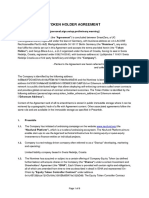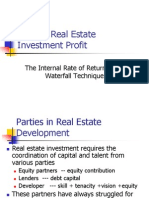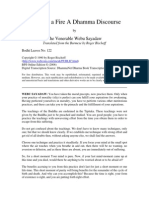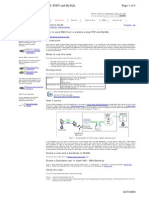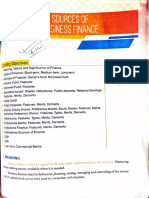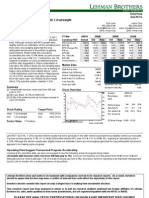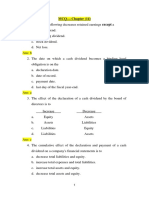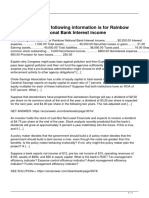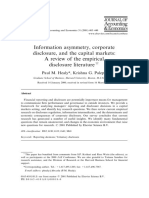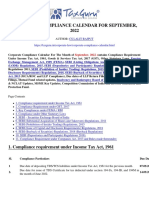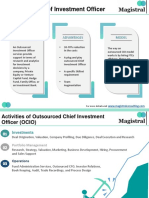Startup Funding
Startup Funding
Uploaded by
TheScienceOfTimeCopyright:
Available Formats
Startup Funding
Startup Funding
Uploaded by
TheScienceOfTimeOriginal Description:
Copyright
Available Formats
Share this document
Did you find this document useful?
Is this content inappropriate?
Copyright:
Available Formats
Startup Funding
Startup Funding
Uploaded by
TheScienceOfTimeCopyright:
Available Formats
How to Fund a Startup
Page 1 of 19
November 2005
Venture funding works like gears. A typical startup goes
through several rounds of funding, and at each round you
want to take just enough money to reach the speed where
you can shift into the next gear.
Few startups get it quite right. Many are underfunded. A few
are overfunded, which is like trying to start driving in third
gear.
I think it would help founders to understand funding better
not just the mechanics of it, but what investors are thinking.
I was surprised recently when I realized that all the worst
problems we faced in our startup were due not to
competitors, but investors. Dealing with competitors was
easy by comparison.
I don't mean to suggest that our investors were nothing but
a drag on us. They were helpful in negotiating deals, for
example. I mean more that conflicts with investors are
particularly nasty. Competitors punch you in the jaw, but
investors have you by the balls.
Apparently our situation was not unusual. And if trouble with
investors is one of the biggest threats to a startup,
managing them is one of the most important skills founders
need to learn.
Let's start by talking about the five sources of startup
funding. Then we'll trace the life of a hypothetical (very
fortunate) startup as it shifts gears through successive
rounds.
Friends and Family
A lot of startups get their first funding from friends and
family. Excite did, for example: after the founders graduated
from college, they borrowed $15,000 from their parents to
start a company. With the help of some part-time jobs they
made it last 18 months.
If your friends or family happen to be rich, the line blurs
between them and angel investors. At Viaweb we got our
first $10,000 of seed money from our friend Julian, but he
was sufficiently rich that it's hard to say whether he should
be classified as a friend or angel. He was also a lawyer,
which was great, because it meant we didn't have to pay
legal bills out of that initial small sum.
The advantage of raising money from friends and family is
that they're easy to find. You already know them. There are
three main disadvantages: you mix together your business
and personal life; they will probably not be as well
8/22/2009
How to Fund a Startup
Page 2 of 19
connected as angels or venture firms; and they may not be
accredited investors, which could complicate your life later.
The SEC defines an "accredited investor" as someone with
over a million dollars in liquid assets or an income of over
$200,000 a year. The regulatory burden is much lower if a
company's shareholders are all accredited investors. Once
you take money from the general public you're more
restricted in what you can do. [1]
A startup's life will be more complicated, legally, if any of
the investors aren't accredited. In an IPO, it might not
merely add expense, but change the outcome. A lawyer I
asked about it said:
When the company goes public, the SEC will
carefully study all prior issuances of stock by the
company and demand that it take immediate
action to cure any past violations of securities
laws. Those remedial actions can delay, stall or
even kill the IPO.
Of course the odds of any given startup doing an IPO are
small. But not as small as they might seem. A lot of startups
that end up going public didn't seem likely to at first. (Who
could have guessed that the company Wozniak and Jobs
started in their spare time selling plans for microcomputers
would yield one of the biggest IPOs of the decade?) Much of
the value of a startup consists of that tiny probability
multiplied by the huge outcome.
It wasn't because they weren't accredited investors that I
didn't ask my parents for seed money, though. When we
were starting Viaweb, I didn't know about the concept of an
accredited investor, and didn't stop to think about the value
of investors' connections. The reason I didn't take money
from my parents was that I didn't want them to lose it.
Consulting
Another way to fund a startup is to get a job. The best sort
of job is a consulting project in which you can build
whatever software you wanted to sell as a startup. Then you
can gradually transform yourself from a consulting company
into a product company, and have your clients pay your
development expenses.
This is a good plan for someone with kids, because it takes
most of the risk out of starting a startup. There never has to
be a time when you have no revenues. Risk and reward are
usually proportionate, however: you should expect a plan
that cuts the risk of starting a startup also to cut the
average return. In this case, you trade decreased financial
risk for increased risk that your company won't succeed as a
startup.
But isn't the consulting company itself startup? No, not
generally. A company has to be more than small and newly
founded to be a startup. There are millions of small
businesses in America, but only a few thousand are
8/22/2009
How to Fund a Startup
Page 3 of 19
startups. To be a startup, a company has to be a product
business, not a service business. By which I mean not that it
has to make something physical, but that it has to have one
thing it sells to many people, rather than doing custom work
for individual clients. Custom work doesn't scale. To be a
startup you need to be the band that sells a million copies of
a song, not the band that makes money by playing at
individual weddings and bar mitzvahs.
The trouble with consulting is that clients have an awkward
habit of calling you on the phone. Most startups operate
close to the margin of failure, and the distraction of having
to deal with clients could be enough to put you over the
edge. Especially if you have competitors who get to work full
time on just being a startup.
So you have to be very disciplined if you take the consulting
route. You have to work actively to prevent your company
growing into a "weed tree," dependent on this source of
easy but low-margin money. [2]
Indeed, the biggest danger of consulting may be that it
gives you an excuse for failure. In a startup, as in grad
school, a lot of what ends up driving you are the
expectations of your family and friends. Once you start a
startup and tell everyone that's what you're doing, you're
now on a path labelled "get rich or bust." You now have to
get rich, or you've failed.
Fear of failure is an extraordinarily powerful force. Usually it
prevents people from starting things, but once you publish
some definite ambition, it switches directions and starts
working in your favor. I think it's a pretty clever piece of
jiujitsu to set this irresistible force against the slightly less
immovable object of becoming rich. You won't have it
driving you if your stated ambition is merely to start a
consulting company that you will one day morph into a
startup.
An advantage of consulting, as a way to develop a product,
is that you know you're making something at least one
customer wants. But if you have what it takes to start a
startup you should have sufficient vision not to need this
crutch.
Angel Investors
Angels are individual rich people. The word was first used
for backers of Broadway plays, but now applies to individual
investors generally. Angels who've made money in
technology are preferable, for two reasons: they understand
your situation, and they're a source of contacts and advice.
The contacts and advice can be more important than the
money. When del.icio.us took money from investors, they
took money from, among others, Tim O'Reilly. The amount
he put in was small compared to the VCs who led the round,
but Tim is a smart and influential guy and it's good to have
him on your side.
8/22/2009
How to Fund a Startup
Page 4 of 19
You can do whatever you want with money from consulting
or friends and family. With angels we're now talking about
venture funding proper, so it's time to introduce the concept
of exit strategy. Younger would-be founders are often
surprised that investors expect them either to sell the
company or go public. The reason is that investors need to
get their capital back. They'll only consider companies that
have an exit strategymeaning companies that could get
bought or go public.
This is not as selfish as it sounds. There are few large,
private technology companies. Those that don't fail all seem
to get bought or go public. The reason is that employees are
investors tooof their timeand they want just as much to
be able to cash out. If your competitors offer employees
stock options that might make them rich, while you make it
clear you plan to stay private, your competitors will get the
best people. So the principle of an "exit" is not just
something forced on startups by investors, but part of what
it means to be a startup.
Another concept we need to introduce now is valuation.
When someone buys shares in a company, that implicitly
establishes a value for it. If someone pays $20,000 for 10%
of a company, the company is in theory worth $200,000. I
say "in theory" because in early stage investing, valuations
are voodoo. As a company gets more established, its
valuation gets closer to an actual market value. But in a
newly founded startup, the valuation number is just an
artifact of the respective contributions of everyone involved.
Startups often "pay" investors who will help the company in
some way by letting them invest at low valuations. If I had
a startup and Steve Jobs wanted to invest in it, I'd give him
the stock for $10, just to be able to brag that he was an
investor. Unfortunately, it's impractical (if not illegal) to
adjust the valuation of the company up and down for each
investor. Startups' valuations are supposed to rise over
time. So if you're going to sell cheap stock to eminent
angels, do it early, when it's natural for the company to
have a low valuation.
Some angel investors join together in syndicates. Any city
where people start startups will have one or more of them.
In Boston the biggest is the Common Angels. In the Bay
Area it's the Band of Angels. You can find groups near you
through the Angel Capital Association. [3] However, most
angel investors don't belong to these groups. In fact, the
more prominent the angel, the less likely they are to belong
to a group.
Some angel groups charge you money to pitch your idea to
them. Needless to say, you should never do this.
One of the dangers of taking investment from individual
angels, rather than through an angel group or investment
firm, is that they have less reputation to protect. A bigname VC firm will not screw you too outrageously, because
other founders would avoid them if word got out. With
individual angels you don't have this protection, as we found
8/22/2009
How to Fund a Startup
Page 5 of 19
to our dismay in our own startup. In many startups' lives
there comes a point when you're at the investors' mercy
when you're out of money and the only place to get more is
your existing investors. When we got into such a scrape, our
investors took advantage of it in a way that a name-brand
VC probably wouldn't have.
Angels have a corresponding advantage, however: they're
also not bound by all the rules that VC firms are. And so
they can, for example, allow founders to cash out partially in
a funding round, by selling some of their stock directly to
the investors. I think this will become more common; the
average founder is eager to do it, and selling, say, half a
million dollars worth of stock will not, as VCs fear, cause
most founders to be any less committed to the business.
The same angels who tried to screw us also let us do this,
and so on balance I'm grateful rather than angry. (As in
families, relations between founders and investors can be
complicated.)
The best way to find angel investors is through personal
introductions. You could try to cold-call angel groups near
you, but angels, like VCs, will pay more attention to deals
recommended by someone they respect.
Deal terms with angels vary a lot. There are no generally
accepted standards. Sometimes angels' deal terms are as
fearsome as VCs'. Other angels, particularly in the earliest
stages, will invest based on a two-page agreement.
Angels who only invest occasionally may not themselves
know what terms they want. They just want to invest in this
startup. What kind of anti-dilution protection do they want?
Hell if they know. In these situations, the deal terms tend to
be random: the angel asks his lawyer to create a vanilla
agreement, and the terms end up being whatever the
lawyer considers vanilla. Which in practice usually means,
whatever existing agreement he finds lying around his firm.
(Few legal documents are created from scratch.)
These heaps o' boilerplate are a problem for small startups,
because they tend to grow into the union of all preceding
documents. I know of one startup that got from an angel
investor what amounted to a five hundred pound
handshake: after deciding to invest, the angel presented
them with a 70-page agreement. The startup didn't have
enough money to pay a lawyer even to read it, let alone
negotiate the terms, so the deal fell through.
One solution to this problem would be to have the startup's
lawyer produce the agreement, instead of the angel's. Some
angels might balk at this, but others would probably
welcome it.
Inexperienced angels often get cold feet when the time
comes to write that big check. In our startup, one of the two
angels in the initial round took months to pay us, and only
did after repeated nagging from our lawyer, who was also,
fortunately, his lawyer.
8/22/2009
How to Fund a Startup
Page 6 of 19
It's obvious why investors delay. Investing in startups is
risky! When a company is only two months old, every day
you wait gives you 1.7% more data about their trajectory.
But the investor is already being compensated for that risk
in the low price of the stock, so it is unfair to delay.
Fair or not, investors do it if you let them. Even VCs do it.
And funding delays are a big distraction for founders, who
ought to be working on their company, not worrying about
investors. What's a startup to do? With both investors and
acquirers, the only leverage you have is competition. If an
investor knows you have other investors lined up, he'll be a
lot more eager to close-- and not just because he'll worry
about losing the deal, but because if other investors are
interested, you must be worth investing in. It's the same
with acquisitions. No one wants to buy you till someone else
wants to buy you, and then everyone wants to buy you.
The key to closing deals is never to stop pursuing
alternatives. When an investor says he wants to invest in
you, or an acquirer says they want to buy you, don't believe
it till you get the check. Your natural tendency when an
investor says yes will be to relax and go back to writing
code. Alas, you can't; you have to keep looking for more
investors, if only to get this one to act. [4]
Seed Funding Firms
Seed firms are like angels in that they invest relatively small
amounts at early stages, but like VCs in that they're
companies that do it as a business, rather than individuals
making occasional investments on the side.
Till now, nearly all seed firms have been so-called
"incubators," so Y Combinator gets called one too, though
the only thing we have in common is that we invest in the
earliest phase.
According to the National Association of Business
Incubators, there are about 800 incubators in the US. This is
an astounding number, because I know the founders of a lot
of startups, and I can't think of one that began in an
incubator.
What is an incubator? I'm not sure myself. The defining
quality seems to be that you work in their space. That's
where the name "incubator" comes from. They seem to vary
a great deal in other respects. At one extreme is the sort of
pork-barrel project where a town gets money from the state
government to renovate a vacant building as a "high-tech
incubator," as if it were merely lack of the right sort of office
space that had till now prevented the town from becoming a
startup hub. At the other extreme are places like Idealab,
which generates ideas for new startups internally and hires
people to work for them.
The classic Bubble incubators, most of which now seem to
be dead, were like VC firms except that they took a much
bigger role in the startups they funded. In addition to
8/22/2009
How to Fund a Startup
Page 7 of 19
working in their space, you were supposed to use their office
staff, lawyers, accountants, and so on.
Whereas incubators tend (or tended) to exert more control
than VCs, Y Combinator exerts less. And we think it's better
if startups operate out of their own premises, however
crappy, than the offices of their investors. So it's annoying
that we keep getting called an "incubator," but perhaps
inevitable, because there's only one of us so far and no word
yet for what we are. If we have to be called something, the
obvious name would be "excubator." (The name is more
excusable if one considers it as meaning that we enable
people to escape cubicles.)
Because seed firms are companies rather than individual
people, reaching them is easier than reaching angels. Just
go to their web site and send them an email. The
importance of personal introductions varies, but is less than
with angels or VCs.
The fact that seed firms are companies also means the
investment process is more standardized. (This is generally
true with angel groups too.) Seed firms will probably have
set deal terms they use for every startup they fund. The fact
that the deal terms are standard doesn't mean they're
favorable to you, but if other startups have signed the same
agreements and things went well for them, it's a sign the
terms are reasonable.
Seed firms differ from angels and VCs in that they invest
exclusively in the earliest phasesoften when the company
is still just an idea. Angels and even VC firms occasionally
do this, but they also invest at later stages.
The problems are different in the early stages. For example,
in the first couple months a startup may completely redefine
their idea. So seed investors usually care less about the idea
than the people. This is true of all venture funding, but
especially so in the seed stage.
Like VCs, one of the advantages of seed firms is the advice
they offer. But because seed firms operate in an earlier
phase, they need to offer different kinds of advice. For
example, a seed firm should be able to give advice about
how to approach VCs, which VCs obviously don't need to do;
whereas VCs should be able to give advice about how to hire
an "executive team," which is not an issue in the seed
stage.
In the earliest phases, a lot of the problems are technical, so
seed firms should be able to help with technical as well as
business problems.
Seed firms and angel investors generally want to invest in
the initial phases of a startup, then hand them off to VC
firms for the next round. Occasionally startups go from seed
funding direct to acquisition, however, and I expect this to
become increasingly common.
Google has been aggressively pursuing this route, and now
8/22/2009
How to Fund a Startup
Page 8 of 19
Yahoo is too. Both now compete directly with VCs. And this
is a smart move. Why wait for further funding rounds to jack
up a startup's price? When a startup reaches the point
where VCs have enough information to invest in it, the
acquirer should have enough information to buy it. More
information, in fact; with their technical depth, the acquirers
should be better at picking winners than VCs.
Venture Capital Funds
VC firms are like seed firms in that they're actual
companies, but they invest other people's money, and much
larger amounts of it. VC investments average several million
dollars. So they tend to come later in the life of a startup,
are harder to get, and come with tougher terms.
The word "venture capitalist" is sometimes used loosely for
any venture investor, but there is a sharp difference
between VCs and other investors: VC firms are organized as
funds, much like hedge funds or mutual funds. The fund
managers, who are called "general partners," get about 2%
of the fund annually as a management fee, plus about 20%
of the fund's gains.
There is a very sharp dropoff in performance among VC
firms, because in the VC business both success and failure
are self-perpetuating. When an investment scores
spectacularly, as Google did for Kleiner and Sequoia, it
generates a lot of good publicity for the VCs. And many
founders prefer to take money from successful VC firms,
because of the legitimacy it confers. Hence a vicious (for the
losers) cycle: VC firms that have been doing badly will only
get the deals the bigger fish have rejected, causing them to
continue to do badly.
As a result, of the thousand or so VC funds in the US now,
only about 50 are likely to make money, and it is very hard
for a new fund to break into this group.
In a sense, the lower-tier VC firms are a bargain for
founders. They may not be quite as smart or as well
connected as the big-name firms, but they are much
hungrier for deals. This means you should be able to get
better terms from them.
Better how? The most obvious is valuation: they'll take less
of your company. But as well as money, there's power. I
think founders will increasingly be able to stay on as CEO,
and on terms that will make it fairly hard to fire them later.
The most dramatic change, I predict, is that VCs will allow
founders to cash out partially by selling some of their stock
direct to the VC firm. VCs have traditionally resisted letting
founders get anything before the ultimate "liquidity event."
But they're also desperate for deals. And since I know from
my own experience that the rule against buying stock from
founders is a stupid one, this is a natural place for things to
give as venture funding becomes more and more a seller's
market.
8/22/2009
How to Fund a Startup
Page 9 of 19
The disadvantage of taking money from less known firms is
that people will assume, correctly or not, that you were
turned down by the more exalted ones. But, like where you
went to college, the name of your VC stops mattering once
you have some performance to measure. So the more
confident you are, the less you need a brand-name VC. We
funded Viaweb entirely with angel money; it never occurred
to us that the backing of a well known VC firm would make
us seem more impressive. [5]
Another danger of less known firms is that, like angels, they
have less reputation to protect. I suspect it's the lower-tier
firms that are responsible for most of the tricks that have
given VCs such a bad reputation among hackers. They are
doubly hosed: the general partners themselves are less
able, and yet they have harder problems to solve, because
the top VCs skim off all the best deals, leaving the lower-tier
firms exactly the startups that are likely to blow up.
For example, lower-tier firms are much more likely to
pretend to want to do a deal with you just to lock you up
while they decide if they really want to. One experienced
CFO said:
The better ones usually will not give a term
sheet unless they really want to do a deal. The
second or third tier firms have a much higher
break rateit could be as high as 50%.
It's obvious why: the lower-tier firms' biggest fear, when
chance throws them a bone, is that one of the big dogs will
notice and take it away. The big dogs don't have worry
about that.
Falling victim to this trick could really hurt you. As one VC
told me:
If you were talking to four VCs, told three of
them that you accepted a term sheet, and then
have to call them back to tell them you were
just kidding, you are absolutely damaged goods.
Here's a partial solution: when a VC offers you a term sheet,
ask how many of their last 10 term sheets turned into deals.
This will at least force them to lie outright if they want to
mislead you.
Not all the people who work at VC firms are partners. Most
firms also have a handful of junior employees called
something like associates or analysts. If you get a call from
a VC firm, go to their web site and check whether the
person you talked to is a partner. Odds are it will be a junior
person; they scour the web looking for startups their bosses
could invest in. The junior people will tend to seem very
positive about your company. They're not pretending; they
want to believe you're a hot prospect, because it would be a
huge coup for them if their firm invested in a company they
discovered. Don't be misled by this optimism. It's the
partners who decide, and they view things with a colder eye.
8/22/2009
How to Fund a Startup
Page 10 of 19
Because VCs invest large amounts, the money comes with
more restrictions. Most only come into effect if the company
gets into trouble. For example, VCs generally write it into
the deal that in any sale, they get their investment back
first. So if the company gets sold at a low price, the
founders could get nothing. Some VCs now require that in
any sale they get 4x their investment back before the
common stock holders (that is, you) get anything, but this is
an abuse that should be resisted.
Another difference with large investments is that the
founders are usually required to accept "vesting"to
surrender their stock and earn it back over the next 4-5
years. VCs don't want to invest millions in a company the
founders could just walk away from. Financially, vesting has
little effect, but in some situations it could mean founders
will have less power. If VCs got de facto control of the
company and fired one of the founders, he'd lose any
unvested stock unless there was specific protection against
this. So vesting would in that situation force founders to toe
the line.
The most noticeable change when a startup takes serious
funding is that the founders will no longer have complete
control. Ten years ago VCs used to insist that founders step
down as CEO and hand the job over to a business guy they
supplied. This is less the rule now, partly because the
disasters of the Bubble showed that generic business guys
don't make such great CEOs.
But while founders will increasingly be able to stay on as
CEO, they'll have to cede some power, because the board of
directors will become more powerful. In the seed stage, the
board is generally a formality; if you want to talk to the
other board members, you just yell into the next room. This
stops with VC-scale money. In a typical VC funding deal, the
board of directors might be composed of two VCs, two
founders, and one outside person acceptable to both. The
board will have ultimate power, which means the founders
now have to convince instead of commanding.
This is not as bad as it sounds, however. Bill Gates is in the
same position; he doesn't have majority control of
Microsoft; in principle he also has to convince instead of
commanding. And yet he seems pretty commanding, doesn't
he? As long as things are going smoothly, boards don't
interfere much. The danger comes when there's a bump in
the road, as happened to Steve Jobs at Apple.
Like angels, VCs prefer to invest in deals that come to them
through people they know. So while nearly all VC funds have
some address you can send your business plan to, VCs
privately admit the chance of getting funding by this route is
near zero. One recently told me that he did not know a
single startup that got funded this way.
I suspect VCs accept business plans "over the transom"
more as a way to keep tabs on industry trends than as a
source of deals. In fact, I would strongly advise against
8/22/2009
How to Fund a Startup
Page 11 of 19
mailing your business plan randomly to VCs, because they
treat this as evidence of laziness. Do the extra work of
getting personal introductions. As one VC put it:
I'm not hard to find. I know a lot of people. If
you can't find some way to reach me, how are
you going to create a successful company?
One of the most difficult problems for startup founders is
deciding when to approach VCs. You really only get one
chance, because they rely heavily on first impressions. And
you can't approach some and save others for later, because
(a) they ask who else you've talked to and when and (b)
they talk among themselves. If you're talking to one VC and
he finds out that you were rejected by another several
months ago, you'll definitely seem shopworn.
So when do you approach VCs? When you can convince
them. If the founders have impressive resumes and the idea
isn't hard to understand, you could approach VCs quite
early. Whereas if the founders are unknown and the idea is
very novel, you might have to launch the thing and show
that users loved it before VCs would be convinced.
If several VCs are interested in you, they will sometimes be
willing to split the deal between them. They're more likely to
do this if they're close in the VC pecking order. Such deals
may be a net win for founders, because you get multiple
VCs interested in your success, and you can ask each for
advice about the other. One founder I know wrote:
Two-firm deals are great. It costs you a little
more equity, but being able to play the two
firms off each other (as well as ask one if the
other is being out of line) is invaluable.
When you do negotiate with VCs, remember that they've
done this a lot more than you have. They've invested in
dozens of startups, whereas this is probably the first you've
founded. But don't let them or the situation intimidate you.
The average founder is smarter than the average VC. So
just do what you'd do in any complex, unfamiliar situation:
proceed deliberately, and question anything that seems odd.
It is, unfortunately, common for VCs to put terms in an
agreement whose consequences surprise founders later, and
also common for VCs to defend things they do by saying
that they're standard in the industry. Standard,
schmandard; the whole industry is only a few decades old,
and rapidly evolving. The concept of "standard" is a useful
one when you're operating on a small scale (Y Combinator
uses identical terms for every deal because for tiny seedstage investments it's not worth the overhead of negotiating
individual deals), but it doesn't apply at the VC level. On
that scale, every negotiation is unique.
Most successful startups get money from more than one of
the preceding five sources. [6] And, confusingly, the names
of funding sources also tend to be used as the names of
8/22/2009
How to Fund a Startup
Page 12 of 19
different rounds. The best way to explain how it all works is
to follow the case of a hypothetical startup.
Stage 1: Seed Round
Our startup begins when a group of three friends have an
idea-- either an idea for something they might build, or
simply the idea "let's start a company." Presumably they
already have some source of food and shelter. But if you
have food and shelter, you probably also have something
you're supposed to be working on: either classwork, or a
job. So if you want to work full-time on a startup, your
money situation will probably change too.
A lot of startup founders say they started the company
without any idea of what they planned to do. This is actually
less common than it seems: many have to claim they
thought of the idea after quitting because otherwise their
former employer would own it.
The three friends decide to take the leap. Since most
startups are in competitive businesses, you not only want to
work full-time on them, but more than full-time. So some or
all of the friends quit their jobs or leave school. (Some of
the founders in a startup can stay in grad school, but at
least one has to make the company his full-time job.)
They're going to run the company out of one of their
apartments at first, and since they don't have any users
they don't have to pay much for infrastructure. Their main
expenses are setting up the company, which costs a couple
thousand dollars in legal work and registration fees, and the
living expenses of the founders.
The phrase "seed investment" covers a broad range. To
some VC firms it means $500,000, but to most startups it
means several months' living expenses. We'll suppose our
group of friends start with $15,000 from their friend's rich
uncle, who they give 5% of the company in return. There's
only common stock at this stage. They leave 20% as an
options pool for later employees (but they set things up so
that they can issue this stock to themselves if they get
bought early and most is still unissued), and the three
founders each get 25%.
By living really cheaply they think they can make the
remaining money last five months. When you have five
months' runway left, how soon do you need to start looking
for your next round? Answer: immediately. It takes time to
find investors, and time (always more than you expect) for
the deal to close even after they say yes. So if our group of
founders know what they're doing they'll start sniffing
around for angel investors right away. But of course their
main job is to build version 1 of their software.
The friends might have liked to have more money in this
first phase, but being slightly underfunded teaches them an
important lesson. For a startup, cheapness is power. The
lower your costs, the more options you havenot just at
this stage, but at every point till you're profitable. When you
8/22/2009
How to Fund a Startup
Page 13 of 19
have a high "burn rate," you're always under time pressure,
which means (a) you don't have time for your ideas to
evolve, and (b) you're often forced to take deals you don't
like.
Every startup's rule should be: spend little, and work fast.
After ten weeks' work the three friends have built a
prototype that gives one a taste of what their product will
do. It's not what they originally set out to doin the process
of writing it, they had some new ideas. And it only does a
fraction of what the finished product will do, but that
fraction includes stuff that no one else has done before.
They've also written at least a skeleton business plan,
addressing the five fundamental questions: what they're
going to do, why users need it, how large the market is,
how they'll make money, and who the competitors are and
why this company is going to beat them. (That last has to
be more specific than "they suck" or "we'll work really
hard.")
If you have to choose between spending time on the demo
or the business plan, spend most on the demo. Software is
not only more convincing, but a better way to explore ideas.
Stage 2: Angel Round
While writing the prototype, the group has been traversing
their network of friends in search of angel investors. They
find some just as the prototype is demoable. When they
demo it, one of the angels is willing to invest. Now the
group is looking for more money: they want enough to last
for a year, and maybe to hire a couple friends. So they're
going to raise $200,000.
The angel agrees to invest at a pre-money valuation of $1
million. The company issues $200,000 worth of new shares
to the angel; if there were 1000 shares before the deal, this
means 200 additional shares. The angel now owns 200/1200
shares, or a sixth of the company, and all the previous
shareholders' percentage ownership is diluted by a sixth.
After the deal, the capitalization table looks like this:
shareholder
shares
percent
------------------------------angel
200
16.7
uncle
50
4.2
each founder
250
20.8
option pool
200
16.7
-------total
1200
100
To keep things simple, I had the angel do a straight cash for
stock deal. In reality the angel might be more likely to make
the investment in the form of a convertible loan. A
convertible loan is a loan that can be converted into stock
later; it works out the same as a stock purchase in the end,
but gives the angel more protection against being squashed
by VCs in future rounds.
Who pays the legal bills for this deal? The startup,
8/22/2009
How to Fund a Startup
Page 14 of 19
remember, only has a couple thousand left. In practice this
turns out to be a sticky problem that usually gets solved in
some improvised way. Maybe the startup can find lawyers
who will do it cheaply in the hope of future work if the
startup succeeds. Maybe someone has a lawyer friend.
Maybe the angel pays for his lawyer to represent both sides.
(Make sure if you take the latter route that the lawyer is
representing you rather than merely advising you, or his
only duty is to the investor.)
An angel investing $200k would probably expect a seat on
the board of directors. He might also want preferred stock,
meaning a special class of stock that has some additional
rights over the common stock everyone else has. Typically
these rights include vetoes over major strategic decisions,
protection against being diluted in future rounds, and the
right to get one's investment back first if the company is
sold.
Some investors might expect the founders to accept vesting
for a sum this size, and others wouldn't. VCs are more likely
to require vesting than angels. At Viaweb we managed to
raise $2.5 million from angels without ever accepting
vesting, largely because we were so inexperienced that we
were appalled at the idea. In practice this turned out to be
good, because it made us harder to push around.
Our experience was unusual; vesting is the norm for
amounts that size. Y Combinator doesn't require vesting,
because (a) we invest such small amounts, and (b) we think
it's unnecessary, and that the hope of getting rich is enough
motivation to keep founders at work. But maybe if we were
investing millions we would think differently.
I should add that vesting is also a way for founders to
protect themselves against one another. It solves the
problem of what to do if one of the founders quits. So some
founders impose it on themselves when they start the
company.
The angel deal takes two weeks to close, so we are now
three months into the life of the company.
The point after you get the first big chunk of angel money
will usually be the happiest phase in a startup's life. It's a lot
like being a postdoc: you have no immediate financial
worries, and few responsibilities. You get to work on juicy
kinds of work, like designing software. You don't have to
spend time on bureaucratic stuff, because you haven't hired
any bureaucrats yet. Enjoy it while it lasts, and get as much
done as you can, because you will never again be so
productive.
With an apparently inexhaustible sum of money sitting
safely in the bank, the founders happily set to work turning
their prototype into something they can release. They hire
one of their friendsat first just as a consultant, so they can
try him outand then a month later as employee #1. They
pay him the smallest salary he can live on, plus 3% of the
company in restricted stock, vesting over four years. (So
8/22/2009
How to Fund a Startup
Page 15 of 19
after this the option pool is down to 13.7%). [7] They also
spend a little money on a freelance graphic designer.
How much stock do you give early employees? That varies
so much that there's no conventional number. If you get
someone really good, really early, it might be wise to give
him as much stock as the founders. The one universal rule is
that the amount of stock an employee gets decreases
polynomially with the age of the company. In other words,
you get rich as a power of how early you were. So if some
friends want you to come work for their startup, don't wait
several months before deciding.
A month later, at the end of month four, our group of
founders have something they can launch. Gradually
through word of mouth they start to get users. Seeing the
system in use by real userspeople they don't knowgives
them lots of new ideas. Also they find they now worry
obsessively about the status of their server. (How relaxing
founders' lives must have been when startups wrote
VisiCalc.)
By the end of month six, the system is starting to have a
solid core of features, and a small but devoted following.
People start to write about it, and the founders are starting
to feel like experts in their field.
We'll assume that their startup is one that could put millions
more to use. Perhaps they need to spend a lot on
marketing, or build some kind of expensive infrastructure,
or hire highly paid salesmen. So they decide to start talking
to VCs. They get introductions to VCs from various sources:
their angel investor connects them with a couple; they meet
a few at conferences; a couple VCs call them after reading
about them.
Step 3: Series A Round
Armed with their now somewhat fleshed-out business plan
and able to demo a real, working system, the founders visit
the VCs they have introductions to. They find the VCs
intimidating and inscrutable. They all ask the same
question: who else have you pitched to? (VCs are like high
school girls: they're acutely aware of their position in the VC
pecking order, and their interest in a company is a function
of the interest other VCs show in it.)
One of the VC firms says they want to invest and offers the
founders a term sheet. A term sheet is a summary of what
the deal terms will be when and if they do a deal; lawyers
will fill in the details later. By accepting the term sheet, the
startup agrees to turn away other VCs for some set amount
of time while this firm does the "due diligence" required for
the deal. Due diligence is the corporate equivalent of a
background check: the purpose is to uncover any hidden
bombs that might sink the company later, like serious
design flaws in the product, pending lawsuits against the
company, intellectual property issues, and so on. VCs' legal
and financial due diligence is pretty thorough, but the
technical due diligence is generally a joke. [8]
8/22/2009
How to Fund a Startup
Page 16 of 19
The due diligence discloses no ticking bombs, and six weeks
later they go ahead with the deal. Here are the terms: a $2
million investment at a pre-money valuation of $4 million,
meaning that after the deal closes the VCs will own a third
of the company (2 / (4 + 2)). The VCs also insist that prior
to the deal the option pool be enlarged by an additional
hundred shares. So the total number of new shares issued is
750, and the cap table becomes:
shareholder
shares
percent
------------------------------VCs
650
33.3
angel
200
10.3
uncle
50
2.6
each founder
250
12.8
employee
36*
1.8
option pool
264
13.5
-------total
1950
100
*unvested
This picture is unrealistic in several respects. For example,
while the percentages might end up looking like this, it's
unlikely that the VCs would keep the existing numbers of
shares. In fact, every bit of the startup's paperwork would
probably be replaced, as if the company were being founded
anew. Also, the money might come in several tranches, the
later ones subject to various conditionsthough this is
apparently more common in deals with lower-tier VCs
(whose lot in life is to fund more dubious startups) than with
the top firms.
And of course any VCs reading this are probably rolling on
the floor laughing at how my hypothetical VCs let the angel
keep his 10.3 of the company. I admit, this is the Bambi
version; in simplifying the picture, I've also made everyone
nicer. In the real world, VCs regard angels the way a jealous
husband feels about his wife's previous boyfriends. To them
the company didn't exist before they invested in it. [9]
I don't want to give the impression you have to do an angel
round before going to VCs. In this example I stretched
things out to show multiple sources of funding in action.
Some startups could go directly from seed funding to a VC
round; several of the companies we've funded have.
The founders are required to vest their shares over four
years, and the board is now reconstituted to consist of two
VCs, two founders, and a fifth person acceptable to both.
The angel investor cheerfully surrenders his board seat.
At this point there is nothing new our startup can teach us
about fundingor at least, nothing good. [10] The startup
will almost certainly hire more people at this point; those
millions must be put to work, after all. The company may do
additional funding rounds, presumably at higher valuations.
They may if they are extraordinarily fortunate do an IPO,
which we should remember is also in principle a round of
funding, regardless of its de facto purpose. But that, if not
beyond the bounds of possibility, is beyond the scope of this
article.
Deals Fall Through
8/22/2009
How to Fund a Startup
Page 17 of 19
Anyone who's been through a startup will find the preceding
portrait to be missing something: disasters. If there's one
thing all startups have in common, it's that something is
always going wrong. And nowhere more than in matters of
funding.
For example, our hypothetical startup never spent more
than half of one round before securing the next. That's more
ideal than typical. Many startupseven successful ones
come close to running out of money at some point. Terrible
things happen to startups when they run out of money,
because they're designed for growth, not adversity.
But the most unrealistic thing about the series of deals I've
described is that they all closed. In the startup world,
closing is not what deals do. What deals do is fall through. If
you're starting a startup you would do well to remember
that. Birds fly; fish swim; deals fall through.
Why? Partly the reason deals seem to fall through so often
is that you lie to yourself. You want the deal to close, so you
start to believe it will. But even correcting for this, startup
deals fall through alarmingly oftenfar more often than,
say, deals to buy real estate. The reason is that it's such a
risky environment. People about to fund or acquire a startup
are prone to wicked cases of buyer's remorse. They don't
really grasp the risk they're taking till the deal's about to
close. And then they panic. And not just inexperienced angel
investors, but big companies too.
So if you're a startup founder wondering why some angel
investor isn't returning your phone calls, you can at least
take comfort in the thought that the same thing is
happening to other deals a hundred times the size.
The example of a startup's history that I've presented is like
a skeletonaccurate so far as it goes, but needing to be
fleshed out to be a complete picture. To get a complete
picture, just add in every possible disaster.
A frightening prospect? In a way. And yet also in a way
encouraging. The very uncertainty of startups frightens
away almost everyone. People overvalue stability
especially young people, who ironically need it least. And so
in starting a startup, as in any really bold undertaking,
merely deciding to do it gets you halfway there. On the day
of the race, most of the other runners won't show up.
Notes
[1] The aim of such regulations is to protect widows and
orphans from crooked investment schemes; people with a
million dollars in liquid assets are assumed to be able to
protect themselves. The unintended consequence is that the
investments that generate the highest returns, like hedge
funds, are available only to the rich.
8/22/2009
How to Fund a Startup
Page 18 of 19
[2] Consulting is where product companies go to die. IBM is
the most famous example. So starting as a consulting
company is like starting out in the grave and trying to work
your way up into the world of the living.
[3] If "near you" doesn't mean the Bay Area, Boston, or
Seattle, consider moving. It's not a coincidence you haven't
heard of many startups from Philadelphia.
[4] Investors are often compared to sheep. And they are
like sheep, but that's a rational response to their situation.
Sheep act the way they do for a reason. If all the other
sheep head for a certain field, it's probably good grazing.
And when a wolf appears, is he going to eat a sheep in the
middle of the flock, or one near the edge?
[5] This was partly confidence, and partly simple ignorance.
We didn't know ourselves which VC firms were the
impressive ones. We thought software was all that
mattered. But that turned out to be the right direction to be
naive in: it's much better to overestimate than
underestimate the importance of making a good product.
[6] I've omitted one source: government grants. I don't
think these are even worth thinking about for the average
startup. Governments may mean well when they set up
grant programs to encourage startups, but what they give
with one hand they take away with the other: the process of
applying is inevitably so arduous, and the restrictions on
what you can do with the money so burdensome, that it
would be easier to take a job to get the money.
You should be especially suspicious of grants whose purpose
is some kind of social engineering-- e.g. to encourage more
startups to be started in Mississippi. Free money to start a
startup in a place where few succeed is hardly free.
Some government agencies run venture funding groups,
which make investments rather than giving grants. For
example, the CIA runs a venture fund called In-Q-Tel that is
modelled on private sector funds and apparently generates
good returns. They would probably be worth approachingif
you don't mind taking money from the CIA.
[7] Options have largely been replaced with restricted stock,
which amounts to the same thing. Instead of earning the
right to buy stock, the employee gets the stock up front,
and earns the right not to have to give it back. The shares
set aside for this purpose are still called the "option pool."
[8] First-rate technical people do not generally hire
themselves out to do due diligence for VCs. So the most
difficult part for startup founders is often responding politely
to the inane questions of the "expert" they send to look you
over.
[9] VCs regularly wipe out angels by issuing arbitrary
amounts of new stock. They seem to have a standard piece
of casuistry for this situation: that the angels are no longer
working to help the company, and so don't deserve to keep
8/22/2009
How to Fund a Startup
Page 19 of 19
their stock. This of course reflects a willful misunderstanding
of what investment means; like any investor, the angel is
being compensated for risks he took earlier. By a similar
logic, one could argue that the VCs should be deprived of
their shares when the company goes public.
[10] One new thing the company might encounter is a down
round, or a funding round at valuation lower than the
previous round. Down rounds are bad news; it is generally
the common stock holders who take the hit. Some of the
most fearsome provisions in VC deal terms have to do with
down roundslike "full ratchet anti-dilution," which is as
frightening as it sounds.
Founders are tempted to ignore these clauses, because they
think the company will either be a big success or a complete
bust. VCs know otherwise: it's not uncommon for startups to
have moments of adversity before they ultimately succeed.
So it's worth negotiating anti-dilution provisions, even
though you don't think you need to, and VCs will try to
make you feel that you're being gratuitously troublesome.
Thanks to Sam Altman, Hutch Fishman, Steve Huffman,
Jessica Livingston, Sesha Pratap, Stan Reiss, Andy
Singleton, Zak Stone, and Aaron Swartz for reading drafts of
this.
8/22/2009
You might also like
- Zig Ziglars Secrets of Closing The Sale PDFDocument6 pagesZig Ziglars Secrets of Closing The Sale PDFTheScienceOfTime100% (13)
- (Routledge Advances in Risk Management) Kin Keung Lai, Jerome Yen, Shifei Zhou, Hao Wang - Volatility Surface and Term Structure - High-Profit Options Trading Strategies-Routledge (2013)Document98 pages(Routledge Advances in Risk Management) Kin Keung Lai, Jerome Yen, Shifei Zhou, Hao Wang - Volatility Surface and Term Structure - High-Profit Options Trading Strategies-Routledge (2013)Yuming MaNo ratings yet
- Swot Grid Matrix Strengths WeaknessesDocument6 pagesSwot Grid Matrix Strengths WeaknessesRyanNo ratings yet
- Financial Modeling Tips For Startups Plug and Play Tech CenterDocument13 pagesFinancial Modeling Tips For Startups Plug and Play Tech CenterVentureArchetypes LLCNo ratings yet
- 50folds Free Cap Table Template v1.1 BLANKDocument39 pages50folds Free Cap Table Template v1.1 BLANKPaulNo ratings yet
- DocSend Fundraising ResearchDocument19 pagesDocSend Fundraising ResearchGimme DunlodsNo ratings yet
- Parklands PPMDocument48 pagesParklands PPMAndoniAlvz100% (1)
- YGG Whitepaper EnglishDocument32 pagesYGG Whitepaper EnglishRenz FernandezNo ratings yet
- BVCA Guide To Corporate Venture CapitalDocument16 pagesBVCA Guide To Corporate Venture CapitalPeter PandaNo ratings yet
- Pitch - Investor Pitch ToolkitDocument35 pagesPitch - Investor Pitch Toolkitapritul3539100% (2)
- How To Be An Angel InvestorDocument9 pagesHow To Be An Angel Investorcarlyblack2006100% (1)
- The Ultimate Guide To Seed Fundraising For FoundersDocument10 pagesThe Ultimate Guide To Seed Fundraising For FoundersPartha MNo ratings yet
- YCombinator Alumni Sales SchoolDocument37 pagesYCombinator Alumni Sales SchoolLuisLazoNo ratings yet
- How Startup Fundraising Works in 2022 - PublicDocument102 pagesHow Startup Fundraising Works in 2022 - PublicLuz Fátima Llaguento QNo ratings yet
- Startup Business Planning: 5 Steps To Success: Why Start With A Financial Modelling?Document35 pagesStartup Business Planning: 5 Steps To Success: Why Start With A Financial Modelling?Bruno Magro100% (1)
- ORRICK Term Sheets + Transaction ProcessDocument68 pagesORRICK Term Sheets + Transaction ProcessKarolina KukielkaNo ratings yet
- Startups ShabdkoshDocument89 pagesStartups ShabdkoshRujuta Kulkarni0% (1)
- Sola Whitepaper V1 enDocument44 pagesSola Whitepaper V1 enyahoooo1234No ratings yet
- Top Ten Term Sheet TricksDocument25 pagesTop Ten Term Sheet TrickslancertwiastNo ratings yet
- Founders Agreement 21Document30 pagesFounders Agreement 21Rando100% (1)
- Guide-to-Venture-Capital IVA PDFDocument90 pagesGuide-to-Venture-Capital IVA PDFNaveen AwasthiNo ratings yet
- Blockchain in Real Estate, FINTRACDocument9 pagesBlockchain in Real Estate, FINTRACByronNo ratings yet
- How To Create A Founders AgreementDocument15 pagesHow To Create A Founders Agreementsan_yadav76100% (1)
- How To Raise Venture Capital and Private Equity Funding - A Guide For EntrepreneursDocument20 pagesHow To Raise Venture Capital and Private Equity Funding - A Guide For EntrepreneursSaif El Deen Khalifa0% (1)
- Financing Model-Understanding Startup Studio Structures - by John Carbrey - FutureSight - MediumDocument12 pagesFinancing Model-Understanding Startup Studio Structures - by John Carbrey - FutureSight - MediummberensteinNo ratings yet
- 2023 Guide To Startup FundingDocument47 pages2023 Guide To Startup FundingssdipaNo ratings yet
- Model Term SheetDocument8 pagesModel Term SheetEylon IsraelyNo ratings yet
- Plug & Play Turkey - ShortDocument15 pagesPlug & Play Turkey - ShortArda Kutsal100% (1)
- Angel InvestorDocument2 pagesAngel InvestorThuận Lê100% (1)
- LandOrc Whitepaper 090921 CompressedDocument47 pagesLandOrc Whitepaper 090921 CompressednavonilNo ratings yet
- RealToken White Paper US v03Document23 pagesRealToken White Paper US v03Isaac GoldNo ratings yet
- Venture Investing - Rules of SuccessDocument100 pagesVenture Investing - Rules of SuccessSrikrishna Sharma KashyapNo ratings yet
- Venture Capital Mena ReportDocument50 pagesVenture Capital Mena ReportBala SubramanianNo ratings yet
- Startup Playbook: Written by Illustrated by Gregory KobergerDocument51 pagesStartup Playbook: Written by Illustrated by Gregory KobergerMushtaque AalamNo ratings yet
- Stages of Venture Capital FinancingDocument7 pagesStages of Venture Capital FinancingcoolchethanNo ratings yet
- Sample Business Plan Outline PDFDocument4 pagesSample Business Plan Outline PDFmelkamuNo ratings yet
- Sequoia Fund Transcript 2015Document24 pagesSequoia Fund Transcript 2015marketfolly.com100% (4)
- Introduction To Private EquityDocument6 pagesIntroduction To Private EquitysimreenNo ratings yet
- Tear SheetDocument3 pagesTear SheetShaw DensioNo ratings yet
- 5 Stages of Startup FundingDocument1 page5 Stages of Startup FundingSachin Khurana0% (1)
- Homebase Stable Buyout Product GuideDocument27 pagesHomebase Stable Buyout Product GuideHappyLand Vietnamese CommunityNo ratings yet
- Bootstrapping A Business PptsDocument58 pagesBootstrapping A Business PptsDr Rizwana0% (1)
- Early ExitsDocument171 pagesEarly ExitsRodrigoGomezGallegoNo ratings yet
- M&A Fee GuideDocument40 pagesM&A Fee GuideLe Hoang Thuc HienNo ratings yet
- PE VC Funding An OverviewDocument20 pagesPE VC Funding An OverviewGautam MehtaNo ratings yet
- Venture Capital: by CA Bharat Kanani COO Permionics Membranes Pvt. LTDDocument31 pagesVenture Capital: by CA Bharat Kanani COO Permionics Membranes Pvt. LTDRagini ChopdaNo ratings yet
- Startup FundingDocument14 pagesStartup FundingViswanathan100% (1)
- SequoiaDocument6 pagesSequoiaMutimbaNo ratings yet
- Sequoia Surge Overview Final-1Document1 pageSequoia Surge Overview Final-1Puneet GuptaNo ratings yet
- A Guide To Venture CapitalDocument4 pagesA Guide To Venture CapitalgargramNo ratings yet
- Angel Investing FAQDocument9 pagesAngel Investing FAQRoy TannerNo ratings yet
- 1 Sequoia Capital Pitch Deck From Info Presented atDocument10 pages1 Sequoia Capital Pitch Deck From Info Presented atGaurav PantNo ratings yet
- Corporate Venture CapitalDocument32 pagesCorporate Venture CapitalgalatimeNo ratings yet
- Private Equity and Venture CapitalDocument13 pagesPrivate Equity and Venture CapitalThalita Palassi Quintela100% (1)
- Non Disclosure AgreementDocument4 pagesNon Disclosure AgreementVictor At SkillsapienNo ratings yet
- Company Token Holder AgreementDocument8 pagesCompany Token Holder AgreementLjutko MeisterNo ratings yet
- Irr Waterfall TechniqueDocument16 pagesIrr Waterfall TechniquehichambhNo ratings yet
- Y Combinator QuestionsDocument3 pagesY Combinator QuestionsZissiva LestariNo ratings yet
- 10 Terms You Must Know Before Raising Startup CapitalDocument8 pages10 Terms You Must Know Before Raising Startup CapitalLeseronNo ratings yet
- Stages of Company Development and Investor TypesDocument5 pagesStages of Company Development and Investor TypesLuis DiazNo ratings yet
- Chronology PatriarchsDocument1 pageChronology PatriarchsTheScienceOfTimeNo ratings yet
- Mewar HistoryDocument53 pagesMewar HistoryTheScienceOfTimeNo ratings yet
- Exotic India BooksDocument4 pagesExotic India BooksTheScienceOfTimeNo ratings yet
- Krishna ScentDocument1 pageKrishna ScentTheScienceOfTimeNo ratings yet
- Sanskrit BooksDocument4 pagesSanskrit BooksTheScienceOfTimeNo ratings yet
- Memory Power MoreDocument6 pagesMemory Power MoreTheScienceOfTimeNo ratings yet
- Aavani Avitta Sankalpam - enDocument5 pagesAavani Avitta Sankalpam - enTheScienceOfTimeNo ratings yet
- Essential Oil CatalogDocument27 pagesEssential Oil CatalogTheScienceOfTimeNo ratings yet
- EZSQL OverviewDocument20 pagesEZSQL OverviewTheScienceOfTimeNo ratings yet
- Mysql and Results ClassDocument2 pagesMysql and Results ClassTheScienceOfTimeNo ratings yet
- DV Survivor GuideDocument8 pagesDV Survivor Guidejeevan_kedari5147No ratings yet
- To Light A Fire A Dhamma Discourse: The Venerable Webu SayadawDocument16 pagesTo Light A Fire A Dhamma Discourse: The Venerable Webu SayadawTheScienceOfTimeNo ratings yet
- PHP MySQL SMS Application PDFDocument4 pagesPHP MySQL SMS Application PDFTheScienceOfTime100% (1)
- Valuing A Business - Aswath Damodaran (Small Tutorial)Document20 pagesValuing A Business - Aswath Damodaran (Small Tutorial)TheScienceOfTime100% (3)
- Source of Business FinanceDocument20 pagesSource of Business FinanceAAS SXD2047No ratings yet
- 7110 s03 QP 2Document12 pages7110 s03 QP 2mstudy123456No ratings yet
- TM 4 - Earning ManagementDocument27 pagesTM 4 - Earning ManagementRifqa aulia nabylaNo ratings yet
- Dividend PolicyDocument6 pagesDividend Policywaqas ahmedNo ratings yet
- Financial and Managerial Accounting PDFDocument1 pageFinancial and Managerial Accounting PDFcons theNo ratings yet
- Tasks Group AccountingDocument11 pagesTasks Group Accountingduchieu2k32k3100% (1)
- Sreepur Textile Mills Limited: Current RatioDocument11 pagesSreepur Textile Mills Limited: Current RatioZidan ZaifNo ratings yet
- Vietnamese Architect Uses Traditional Materials in Modern WorksDocument15 pagesVietnamese Architect Uses Traditional Materials in Modern WorksHường ThuNo ratings yet
- A Comparative Study On Stock Market and Mutual Fund IndustryDocument2 pagesA Comparative Study On Stock Market and Mutual Fund IndustrySneha RauniyarNo ratings yet
- Link REIT: (0823.HK - HKD 17.02) 1-OverweightDocument10 pagesLink REIT: (0823.HK - HKD 17.02) 1-OverweightlbnxxxxNo ratings yet
- CH 14 - MCQ PDFDocument11 pagesCH 14 - MCQ PDFYAHIA ADELNo ratings yet
- Solved The Following Information Is For Rainbow National Bank Interest IncomeDocument1 pageSolved The Following Information Is For Rainbow National Bank Interest IncomeM Bilal SaleemNo ratings yet
- Financial Statement AnalysisDocument79 pagesFinancial Statement AnalysisAbdi Rahman Bariise100% (2)
- Damodaran - Estimating Discount RateDocument60 pagesDamodaran - Estimating Discount RateYến Nhi100% (1)
- Healy and Palepu 2001Document36 pagesHealy and Palepu 2001Anonymous nTGsxVNo ratings yet
- Problems Income Tax On CorporationsDocument3 pagesProblems Income Tax On CorporationsJemimah Malicsi0% (1)
- NISM Series V A MFD Certification Examination June 2022 FinalDocument521 pagesNISM Series V A MFD Certification Examination June 2022 FinaladithyaNo ratings yet
- Corporate Compliance Calendar For September, 2022 - Taxguru - inDocument25 pagesCorporate Compliance Calendar For September, 2022 - Taxguru - inSubhash VishwakarmaNo ratings yet
- RA 337 The General Banking Act of 1948Document20 pagesRA 337 The General Banking Act of 1948Juan Luis LusongNo ratings yet
- CB1 Mock 1-1Document13 pagesCB1 Mock 1-1Garima AgarwalNo ratings yet
- One Stop Company SecretaryDocument25 pagesOne Stop Company Secretaryaraza_962307No ratings yet
- Insider Trading in India in Comparison With USADocument13 pagesInsider Trading in India in Comparison With USAPoonam Sarpal Prasad100% (1)
- Inter-Paper-4 RTPS, MTPs and Past PapersDocument342 pagesInter-Paper-4 RTPS, MTPs and Past PapersMainak AdhikaryNo ratings yet
- LG Distribution NetworkDocument8 pagesLG Distribution NetworkMunawar Zaheer100% (1)
- Capsim UserGuideDocument13 pagesCapsim UserGuiden589454fNo ratings yet
- Analysis of Competitiveness of The Agribusiness Sector Companies Using Porter'S Five ForcesDocument11 pagesAnalysis of Competitiveness of The Agribusiness Sector Companies Using Porter'S Five ForceseryNo ratings yet
- Outsourced Chief Investment Officer (OCIO) - Details, Activities and BenefitsDocument4 pagesOutsourced Chief Investment Officer (OCIO) - Details, Activities and BenefitsTanyamagistralNo ratings yet
- Financial Analysis of Tesco PLCDocument7 pagesFinancial Analysis of Tesco PLCSyed Toseef Ali100% (1)
- ValuationDocument15 pagesValuationAAMOD KHARB PGP 2018-20 BatchNo ratings yet















